Late summer into fall is the prefect time to find and gather goldenrod to use as a home remedy. Today on the blog, you’ll learn some of the best ways to make use of this late summer herb.
This page may contain affiliate links, which means if you purchase through my links I get a small commission, but it doesn’t cost you anything extra. Thank you for supporting my blog!

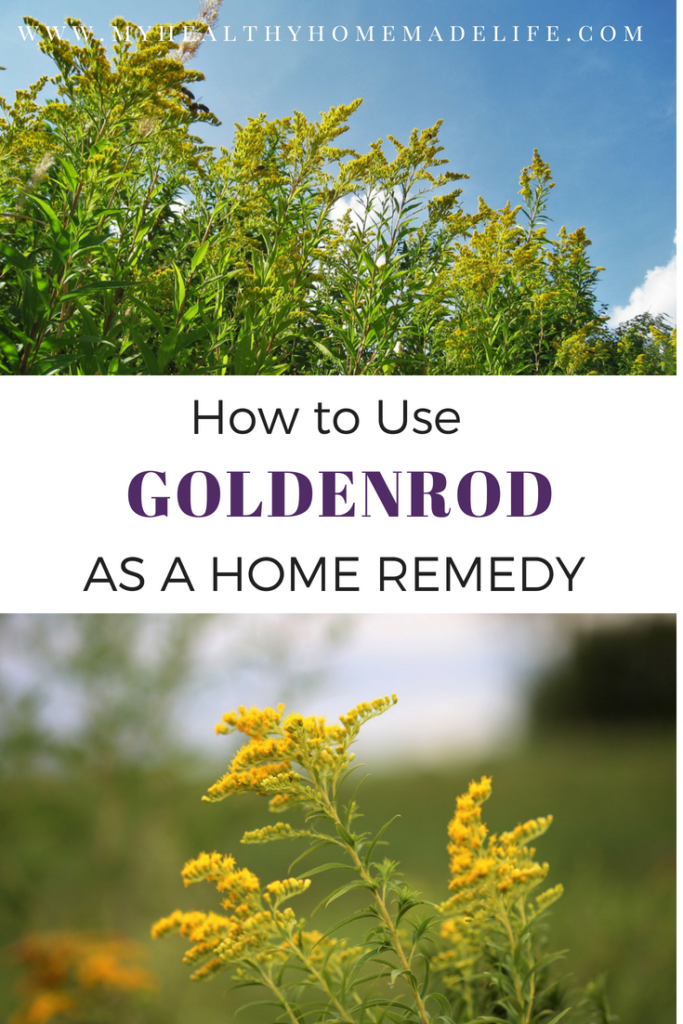
Goldenrod is starting to bloom! It brightens the meadows and roadsides with its gorgeous, yellow blooms and reminds us that fall is coming.
Many people take one look at goldenrod and run the other way, coughing and sneezing–thinking it’s causing their allergies when in fact, it is actually the cure.
You see, goldenrod’s pollen is heavy and sticky and doesn’t blow through the air causing us to cough and sneeze like another plant that often grows nearby–ragweed. Not quite as noticeable as the beautiful goldenrod, ragweed is often the real cause for seasonal allergies this time of year. (Here’s more on Goldenrod vs. Ragweed from the Herbal Academy of New England. )
When to Harvest Goldenrod
Harvest goldenrod flowers, buds and leaves just as the flowers are beginning to open rather than when the plant is in full bloom. Avoid any plants that have been infected with powdery mildew.
There are over a hundred different species of goldenrod and the aroma, taste and medicinal qualities can all vary. Once you’ve correctly identified goldenrod, crush the leaves in your hand. Some of the most delicious goldenrod for tea has an anise-like scent. You’ll find some goldenrod more bitter, some more astringent and some more aromatic. All species of goldenrod can be used medicinally.
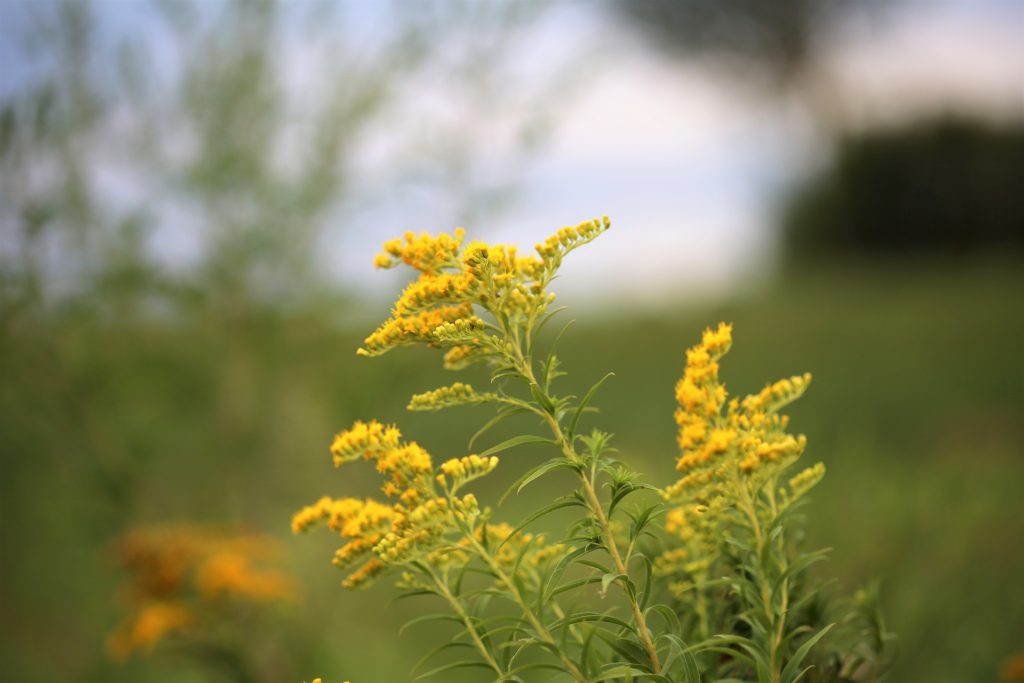
How to Use Goldenrod As a Home Remedy
Goldenrod for Allergies, Colds & Flu
Goldenrod can be extremely useful for upper respiratory congestion, especially when that congestion is drippy–the eyes are watering, the nose is running and you’ve gone through a whole box of Kleenex in a few hours. Goldenrod’s astringency will help dry up all that congestion. Whether it’s due to allergies, sinusitis or colds or flu, think of goldenrod when you need a strong decongestant.
During a cold and flu, goldenrod can also help alleviate an inflamed sore throat and help to break a fever by causing you to sweat.
Try goldenrod in a tea, tincture or an infused honey or syrup (maybe add a bit of goldenrod to your Elderberry Syrup.) Be sure to dry some goldenrod for use over the winter.
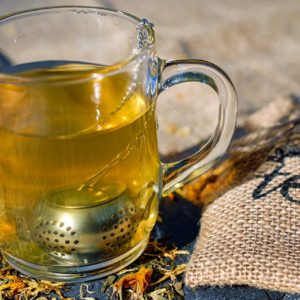
Fresh Goldenrod Tea with Lemon & Honey
A light and delicious end of summer tea. Delicious hot or iced. Yields 1 quart.
Ingredients
- 1/2 cup chopped fresh goldenrod leaves, flowers and buds
- 4 cups boiling water
- 1/2 lemon, juiced
- honey to taste
Instructions
- Add the fresh chopped herbs to a pot, teapot, or glass canning jar. Pour boiling water over the herbs and let steep for 30 minutes. Add fresh lemon juice and honey to taste.
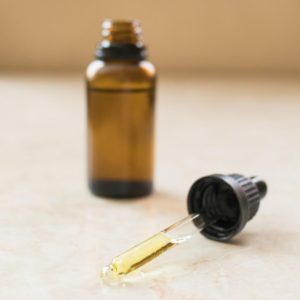
Goldenrod Tincture
An herbal extract (tincture) made from either fresh or dried goldenrod flowers, buds and stems.
Equipment
- 1 Wide Mouth Pint or Half Pint Jar with Lid use a larger jar if making a larger quantity
- 1 Amber Bottle For storing extra tincture. Optional
- 1 1-2 oz amber bottle with dropper
Ingredients
- fresh or dried goldenrod flowers See instructions
- 1/2-1 pint 80-100 proof vodka or apple cider vinegar
Instructions
- Fill the jar half way with dried goldenrod or 2/3 of the way with chopped fresh goldenrod.
- Pour the alcohol or apple cider vinegar over the herbs. Completely fill the jar and seal with a lid. Shake well.
- Store your jar in a warm spot, out of direct sunlight for 4-6 weeks. Shake your jar often, every day if possible.
- After 4-6 weeks, strain off the herbs and discard.
- Fill a small tincture bottle (with a dropper) for daily use and pour the remainder in a clean glass amber jar.
- Label and date your bottle and jar. Store in a cool, dark place where it will keep for several years.
Notes
Apple cider vinegar will cause your metal caps to rust. If using apple cider vinegar for your tincture, use either a plastic lid or place a piece of plastic wrap between the jar and the metal lid to prevent rusting.

How to Use Goldenrod As a Home Remedy
Goldenrod for Bruises, Sprains, Injuries and Sore Muscles
If you have plenty of goldenrod, it makes a good substitute for arnica in an infused oil or salve. Goldenrod is helpful for bruises, sprains and minor injuries from trauma.
Goldenrod makes a fine addition to any herbal first aid salve or infused oil due to its anti-inflammatory, anti-microbial, astringent and wound healing properties. Make a simple goldenrod salve or add it to your Backyard Herbal Healing Salve, All Purpose Calendula Salve or combine it with plantain.
Goldenrod also helps relieve sore, pulled muscles, stiffness and pain. Use goldenrod infused oil as a massage oil or add some goldenrod to the Warming Ginger Massage Oil.
You can find good quality pre-made goldenrod infused oil and salve on Etsy if you don’t want to make your own.

Using Goldenrod Safely
It’s best to avoid consuming goldenrod during pregnancy. Goldenrod can be overly drying if used as a tonic tea for daily use, especially if you have a dry constitution.
It can also cause an allergic reaction in some people (especially if there is a sensitivity to the Aster family.)
Where to Buy Dried Goldenrod
If you don’t grow your own herbs, it’s important to purchase your dried herbs from reputable companies to ensure you are getting unadulterated herbs that have been ethically harvested.
Goldenrod Seeds: Amazon or Strictly Medicinal Seeds
Dried Goldenrod: Amazon or Mountain Rose Herbs
Goldenrod Tea: Amazon or Mountain Rose Herb
Goldenrod Tincture: Amazon or Mountain Rose Herbs
Interested in more recipes featuring goldenrod?
You might enjoy my new ebook, Exploring Herbs: Fall Edition which contains nearly 20 recipes for nourishing, detoxifying and immune-building recipes utilizing the herbs of fall. You’ll find:
-
Recipes Using Nourishing & Detoxifying Herbs as Food
-
Immune Building Herbal Home Remedies
-
Nourishing Homemade Body Care Recipes
Learn how to use nourishing, detoxing and immune boosting herbs such as goldenrod, burdock, alfalfa, astragalus, schisandra berries, elderberries, medicinal mushrooms and more.
Learn more

Have you ever used goldenrod as a herbal home remedy? Please let me know by leaving a comment below or sharing a comment or picture on my Facebook Page or on Instagram .

I love hearing your feedback!
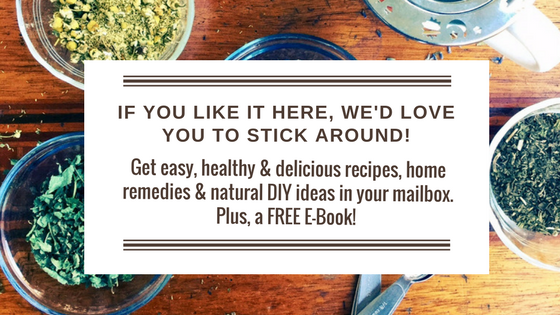
Subscribe Here
References:
Chestnut School of Herbal Medicine. Foraging Course. (2018)
Herb Mentor by Learning Herbs
This site is for educational purposes only. It does not provide medical advice. Information found on myhealthyhomemadelife.com is meant to motivate you to make your own health care and dietary decisions based upon your own research and in partnership with your health care provider.

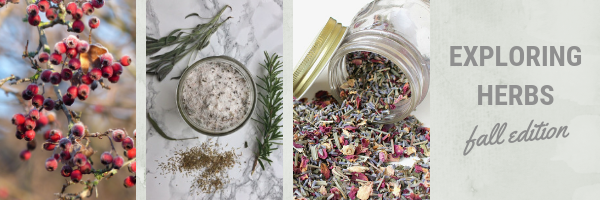
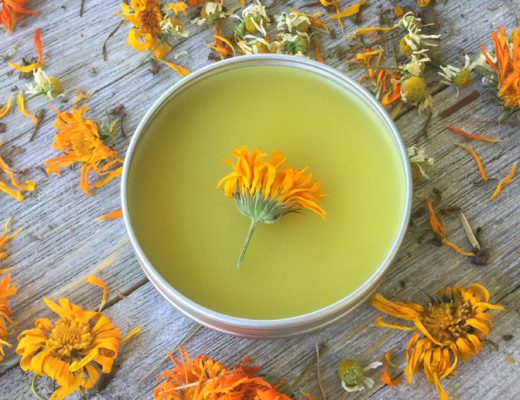
34 Comments